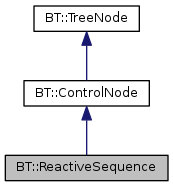The ReactiveSequence is similar to a ParallelNode. All the children are ticked from first to last: More...
#include <reactive_sequence.h>
Inheritance diagram for BT::ReactiveSequence:

Public Member Functions | |
| ReactiveSequence (const std::string &name) | |
 Public Member Functions inherited from BT::ControlNode Public Member Functions inherited from BT::ControlNode | |
| void | addChild (TreeNode *child) |
| The method used to add nodes to the children vector. More... | |
| const TreeNode * | child (size_t index) const |
| const std::vector< TreeNode * > & | children () const |
| size_t | childrenCount () const |
| ControlNode (const std::string &name, const NodeConfiguration &config) | |
| virtual void | halt () override |
| void | haltChild (size_t i) |
| void | haltChildren () |
| void | haltChildren (size_t first) |
| virtual NodeType | type () const overridefinal |
| virtual | ~ControlNode () override=default |
 Public Member Functions inherited from BT::TreeNode Public Member Functions inherited from BT::TreeNode | |
| const NodeConfiguration & | config () const |
| virtual BT::NodeStatus | executeTick () |
| The method that should be used to invoke tick() and setStatus();. More... | |
| template<typename T > | |
| Result | getInput (const std::string &key, T &destination) const |
| template<typename T > | |
| Optional< T > | getInput (const std::string &key) const |
| StringView | getRawPortValue (const std::string &key) const |
| bool | isHalted () const |
| const std::string & | name () const |
| Name of the instance, not the type. More... | |
| const std::string & | registrationName () const |
| registrationName is the ID used by BehaviorTreeFactory to create an instance. More... | |
| template<typename T > | |
| Result | setOutput (const std::string &key, const T &value) |
| NodeStatus | status () const |
| StatusChangeSubscriber | subscribeToStatusChange (StatusChangeCallback callback) |
| subscribeToStatusChange is used to attach a callback to a status change. When StatusChangeSubscriber goes out of scope (it is a shared_ptr) the callback is unsubscribed automatically. More... | |
| TreeNode (std::string name, NodeConfiguration config) | |
| TreeNode main constructor. More... | |
| uint16_t | UID () const |
| BT::NodeStatus | waitValidStatus () |
| virtual | ~TreeNode ()=default |
Private Member Functions | |
| virtual BT::NodeStatus | tick () override |
| Method to be implemented by the user. More... | |
Additional Inherited Members | |
 Public Types inherited from BT::TreeNode Public Types inherited from BT::TreeNode | |
| typedef std::shared_ptr< TreeNode > | Ptr |
| using | StatusChangeCallback = StatusChangeSignal::CallableFunction |
| using | StatusChangeSignal = Signal< TimePoint, const TreeNode &, NodeStatus, NodeStatus > |
| using | StatusChangeSubscriber = StatusChangeSignal::Subscriber |
 Static Public Member Functions inherited from BT::TreeNode Static Public Member Functions inherited from BT::TreeNode | |
| static Optional< StringView > | getRemappedKey (StringView port_name, StringView remapping_value) |
| static bool | isBlackboardPointer (StringView str) |
| static StringView | stripBlackboardPointer (StringView str) |
 Protected Member Functions inherited from BT::TreeNode Protected Member Functions inherited from BT::TreeNode | |
| void | modifyPortsRemapping (const PortsRemapping &new_remapping) |
| void | setRegistrationID (StringView ID) |
| void | setStatus (NodeStatus new_status) |
 Protected Attributes inherited from BT::ControlNode Protected Attributes inherited from BT::ControlNode | |
| std::vector< TreeNode * > | children_nodes_ |
Detailed Description
The ReactiveSequence is similar to a ParallelNode. All the children are ticked from first to last:
- If a child returns RUNNING, tick the next sibling.
- If a child returns SUCCESS, tick the next sibling.
- If a child returns FAILURE, stop and return FAILURE.
If all the children return SUCCESS, this node returns SUCCESS.
IMPORTANT: to work properly, this node should not have more than a single asynchronous child.
Definition at line 34 of file reactive_sequence.h.
Constructor & Destructor Documentation
|
inline |
Definition at line 38 of file reactive_sequence.h.
Member Function Documentation
|
overrideprivatevirtual |
Method to be implemented by the user.
Implements BT::TreeNode.
Definition at line 18 of file reactive_sequence.cpp.
The documentation for this class was generated from the following files: